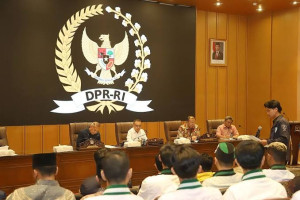House plans to revive the Supreme Advisory Council
The House of Representatives (DPR) has planned to revive the New Order-era Supreme Advisory Council (DPA) through a revision of Law Number 19/2016 on the Presidential Advisory Council (Wantimpres).
The DPA, which previously existed in 1945-1950 and from 1959 to 2003, is a goverment body that provides advises for the President of Indonesia, but was largely regarded as powerless. Its functions were limited to offering proposals to the goverment on matters of national importance. In 2007, the DPA was succeeded by the Presidential Advisory Council (Wantimpres).
Secretary General of Gerindra Party, Ahmad Muzani, said that the debate about a presidential system centered on the president is an old discourse. Muzani, who is also Deputy Speaker of the People’s Consultative Assembly (MPR) noted that, in practice, there are parliamentary nuances even though Indonesia grants authority to the president as both head of state and head of government.
"We are gradually strengthening the presidential system of government, which we have chosen as an institution directly elected by the people. The president feels the need to improve this system," Muzani said in Jakarta, on Tuesday, July 16, 2024.
He asserted that this flexibility does not violate the constitution, as it aims to make the presidential system more effective.
"No, it does not violate the constitution because this is part of making the presidential system more effective," he said.
Constitutional law expert Bivitri Susanti criticized the revision of Law Number 19/2016, arguing that it does not benefit the public but rather the political elite.
"That's why it's being rushed. It’s being made before the new government exists so that positions can be allocated," Bivitri said as quoted by Katadata on July 12, 2024.
The House had already approved the revision as a legislative initiative in a plenary session on Thursday, Juli 11, 2024. The approval process was expedited, allowing the draft bill to be quickly brought to the plenary session. Notably, the revision was not included in the 2020-2024 priority National Legislation Program (Prolegnas).
Bivitri pointed out that the revision is similar to the State Ministry Law, creating new positions that can be filled by the political configuration that won the 2024 elections.
As a lecturer at the Indonesian Jentera School of Law (STH Indonesia Jentera), Bivitri categorized the bills being processed by the DPR into two groups: laws aimed at power-sharing, such as the revisions to the Wantimpres Law and the State Ministry Law, and laws intended to stifle public oversight, such as the Indonesian Military (TNI)-National Police (Polri) Law.
Bivitri also highlighted the unusual nature of changing the name from Wantimpres to DPA, as the fourth amendment to the 1945 Constitution replaced the DPA with Wantimpres.
According to the fourth amendment, Wantimpres is not an institution. Bivitri argued that the president does not need a special advisory body since there are already ministers and special staff serving as advisors.
"They want to bring it back to the way it was during the New Order era," Bivitri concluded.
Already have an account? Sign In
-
Start reading
Freemium
-
Monthly Subscription
20% OFF$29.75
$37.19/MonthCancel anytime
This offer is open to all new subscribers!
Subscribe now -
Yearly Subscription
33% OFF$228.13
$340.5/YearCancel anytime
This offer is open to all new subscribers!
Subscribe now







